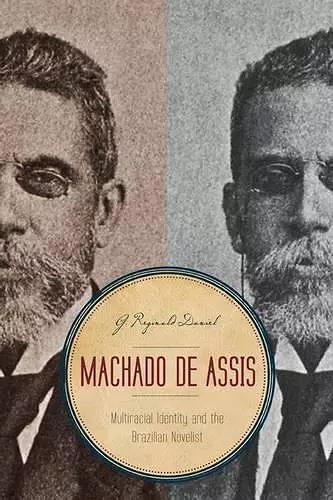Machado de Assis
Multiracial Identity and the Brazilian Novelist
Format:Hardback
Publisher:Pennsylvania State University Press
Published:7th May '12
Currently unavailable, and unfortunately no date known when it will be back
This hardback is available in another edition too:
- Paperback£28.95(9780271052472)

Joaquim Maria Machado de Assis (1839–1908) was Brazil’s foremost novelist of the late nineteenth and early twentieth centuries. As a mulatto, Machado experienced the ambiguity of racial identity throughout his life. Literary critics first interpreted Machado as an embittered misanthrope uninterested in the plight of his fellow African Brazilians. By midcentury, however, a new generation of critics asserted that Machado’s writings did reveal his interest in slavery, race, and other contemporary social issues, but their interpretations went too far in the other direction. G. Reginald Daniel, an expert on Brazilian race relations, takes a fresh look at how Machado’s writings were inflected by his life—especially his experience of his own racial identity. The result is a new interpretation that sees Machado as endeavoring to transcend his racial origins by universalizing the experience of racial ambiguity and duality into a fundamental mode of human existence.
“G. Reginald Daniel’s work is a thoughtful analysis of how racial identity and race relations are dealt with in the work of Machado de Assis. It allows us to understand how Machado’s universal principles, as well as his ambiguity regarding the ‘mulatto’ condition in Brazil, in fact erode the very foundations of raciologic thinking. In so doing, Daniel opens a very interesting window onto the singularity of Brazil’s way of dealing with race and the differences between the Brazilian and the North American historical cases with regard to their African and African American (or Afro-Brazilian) heritage. Daniel’s book brings fresh air to the appreciation of Machado’s work in the United States, where it has gained the attention of outstanding critics, at the same time that it provides the reader with fundamental keys to the understanding of Brazil’s complex and at times unique position in the African Diaspora.”
—Pedro Meira Monteiro, Princeton University
“One of the most fascinating aspects of Brazilian society is the unique construction of racial identity. While racial discrimination does exist in Brazil, it has never been grounded, as in the United States, in institutional segregation, and, indeed, racial matters have played an important role in defining Brazilian national identity. Reginald Daniel explores the complex construction of racial matters in Brazil by grounding himself in the ironic, skeptical, and ambiguous narratives of the great mulatto writer Joaquim Maria Machado de Assis.”
—David William Foster, Arizona State University
“G. Reginald Daniel is a gifted sociologist of race as well as a sensitive analyst of literary texts. His Machado de Assis: Multiracial Identity and the Brazilian Novelist is a masterful treatment of Assis’s writings, contextualized in a precise racial history of Brazil as well as in its intellectual and literary developments and traditions. This is a must-read for scholars and students of Assis’s writings, Brazilian literary traditions, the sociology of race, and African Brazilians, especially from the late nineteenth through the early twentieth century, a period that finally saw the Brazilian abolition of slavery.”
—Laura A. Lewis, James Madison University
“This thoughtful, scholarly study illuminates and contextualizes the writings of Brazil’s most famous author while casting him as a universalizing ‘meta-mulatto.’ Traditional critics have argued that Machado’s detached, ironic style, egoistic upper-class characters, and unreliable narrators bespeak indifference to social issues of the day—slavery, racism—and to the debate over literary brasilidade (‘Brazilianness’). . . . Daniel shows that despite Machado’s success, light color, erudition, and European orientation, he was regarded as a racialized other who experienced the dualism of being neither black nor white. Daniel submits that the mulatto dualism serves as a metaphor for a universal dualism that Machado believed characterizes human existence generally. . . . For Machado, the struggle to reconcile binarisms is both personal and universal.”
—D. L. Heyck Choice
ISBN: 9780271052465
Dimensions: 229mm x 152mm x 30mm
Weight: 612g
344 pages